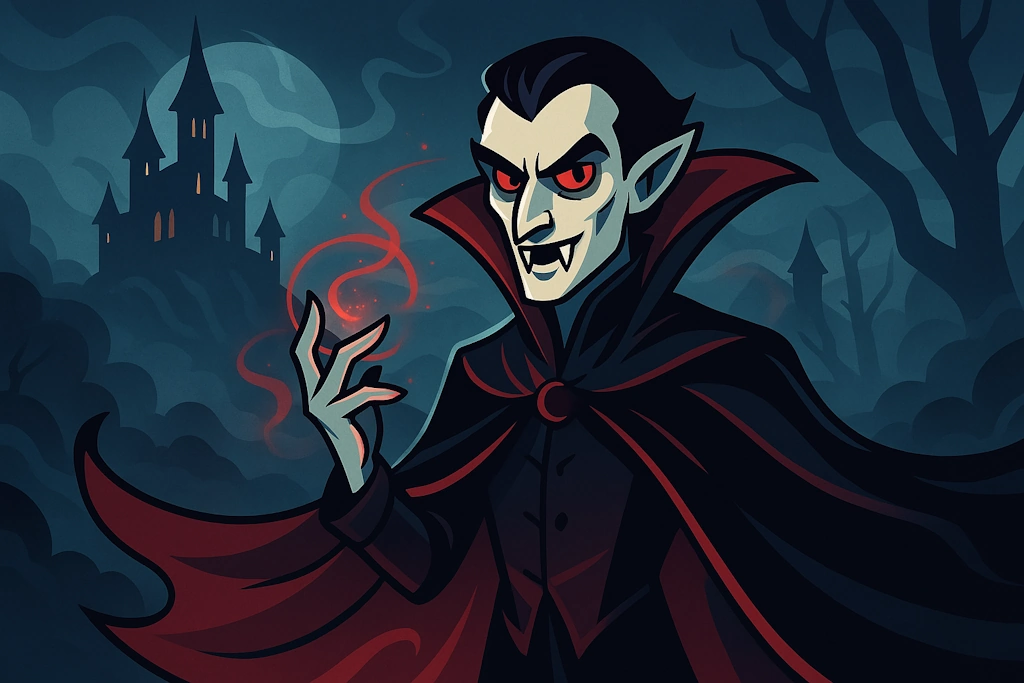220+ Best Vampire Names
Try our vampire name generator →
A curated collection of 100+ aristocratic vampire names, drawing from Eastern European nobility, Gothic literature, and centuries of vampire mythology.
Etymology and Origins of Vampire Names
Vampire nomenclature spans centuries of folklore and literature, with roots in multiple European languages. The term "vampire" itself emerged from Old Church Slavonic "ǫpyrь" (упырь), spreading through German (Vampir) and French (vampire) in the 18th century during the famous vampire hysteria in Eastern Europe.
Historical Origins and Evolution
Vampire names draw from various cultural and linguistic traditions:
- Slavic Origins:
- "Vlad" from владѣти (vladeti) - "to rule"
- "Mircea" from мир (mir) - "peace, world"
- "Dracula" from Dracul - "dragon" or "devil"
- Hungarian Elements:
- "Báthory" - Ancient noble family name
- "Erzsébet" - Hungarian form of Elizabeth
🧛♂️ Discover Elite Vampire Names
Uncover our collection of the most aristocratic and mysterious vampire names!
View Top 100 Vampire Names 🧛♀️Naming Conventions and Structure
Vampire names follow sophisticated patterns reflecting their noble and supernatural nature:
- Noble Titles:
- Count/Countess (from Latin "comes" - companion)
- Baron/Baroness (Germanic "baro" - freeman)
- Voivode (Slavic "воевода" - war-leader)
- Name Components:
- Gothic Elements: von, van, de (nobility markers)
- Dark Themes: Blood-, Night-, Shadow-, Raven-
- Ancient Roots: -slav, -mir, -escu (Slavic suffixes)
Cultural Lineages and Regional Variations
Different regions developed distinct vampire naming traditions:
- Transylvanian Tradition:
- Use of historical noble family names
- Integration of Romanian patronymics
- Victorian Gothic:
- Anglicized Eastern European names
- Romantic-era poetic elements
Literary Influences and Famous Vampires
Notable vampires who shaped naming conventions:
- Historical Figures:
- Vlad III Dracula (1431-1476) - The historical Dracula
- Elizabeth Báthory (1560-1614) - The "Blood Countess"
- Literary Characters:
- Count Dracula - Bram Stoker's iconic creation
- Carmilla - Le Fanu's feminine archetype
- Lord Ruthven - Polidori's aristocratic vampire
Modern Adaptations and Contemporary Usage
Contemporary media has evolved vampire naming conventions:
- Gothic Romance:
- Elegant, romantic-sounding combinations
- Integration of classical elements
- Urban Fantasy:
- Modern names with gothic elements
- Blend of contemporary and ancient
Name Generation Methodology
This generator creates authentic vampire names by combining:
- Noble Elements: Titles and aristocratic markers
- Historical Components: Traditional vampire family names
- Dark Aesthetics: Gothic and supernatural elements
- Cultural Markers: Regional variations and historical significance
Each generated name maintains historical authenticity while capturing the dark, aristocratic nature of vampire mythology. The names reflect centuries of folklore and literary tradition, drawing from Eastern European nobility, Gothic literature, and modern vampire fiction. Whether used for storytelling, gaming, or creative projects, these names carry the weight of vampire mythology while maintaining believability and style.
Most Famous Vampires
Throughout literature, film, and popular culture, certain vampires have achieved legendary status through their compelling stories and enduring influence. These iconic vampires, from Bram Stoker's Count Dracula to Anne Rice's Lestat, have shaped our understanding of vampire mythology and continue to inspire new interpretations. Each name carries the weight of rich storytelling traditions, representing different aspects of vampire lore - from the aristocratic and seductive to the monstrous and tragic.
Top 100+ Male Vampire Names
Male vampire names often emphasize nobility, power, and ancient lineage. These names typically combine aristocratic titles (Count, Baron, Lord) with names drawn from Eastern European nobility and Gothic traditions. Many incorporate elements suggesting darkness, blood, or supernatural power, reflecting the vampire's connection to the night and their immortal nature. From ancient Slavic roots to Victorian Gothic influences, these names embody the sophisticated and dangerous nature of male vampires.
Top 100+ Female Vampire Names
Female vampire names blend elegance with dark mystique, drawing inspiration from Gothic literature and historical figures like Elizabeth Báthory. These names often combine noble titles (Countess, Lady, Duchess) with feminine versions of traditional vampire names or original combinations suggesting both beauty and power. The names reflect the complex nature of female vampires - seductive yet deadly, refined yet primal, incorporating elements of both ancient nobility and supernatural darkness.
Create Your Own Vampire Name
Want to create your own unique vampire name? Try our vampire name generator to create gothic vampire names drawing from Eastern European, Victorian, and classical vampire lore.